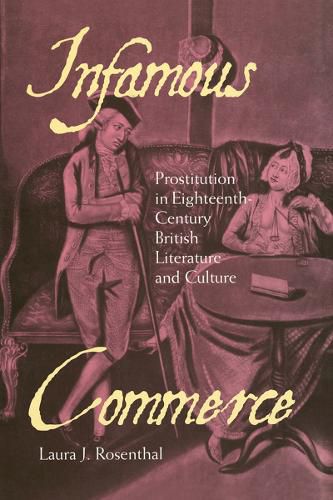Readings Newsletter
Become a Readings Member to make your shopping experience even easier.
Sign in or sign up for free!
You’re not far away from qualifying for FREE standard shipping within Australia
You’ve qualified for FREE standard shipping within Australia
The cart is loading…






In Infamous Commerce, Laura J. Rosenthal uses literary and historical sources to explore the meaning of prostitution from the Restoration through the eighteenth century, showing how both reformers and libertines constructed the modern meaning of sex work during this period. From Grub Street’s lurid whore biographies to the period’s most acclaimed novels, the prostitute was depicted as facing a choice between abject poverty and some form of sex work. Prostitution, in Rosenthal’s view, confronted the core controversies of eighteenth-century capitalism: luxury, desire, global trade, commodification, social mobility, gender identity, imperialism, self-ownership, alienation, and even the nature of work itself. In the context of extensive research into printed accounts of both male and female prostitution-among them sermons, popular prostitute biographies, satire, pornography, brothel guides, reformist writing, and travel narratives-Rosenthal offers in-depth readings of Samuel Richardson’s Clarissa and Pamela and the responses to the latter novel (including Eliza Haywood’s Anti-Pamela), Bernard Mandeville’s defenses of prostitution, Daniel Defoe’s Roxana, Henry Fielding’s Tom Jones, and travel journals about the voyages of Captain Cook to the South Seas. Throughout, Rosenthal considers representations of the prostitute’s own sexuality (desire, revulsion, etc.) to be key parts of the changing meaning of the oldest profession.
$9.00 standard shipping within Australia
FREE standard shipping within Australia for orders over $100.00
Express & International shipping calculated at checkout
In Infamous Commerce, Laura J. Rosenthal uses literary and historical sources to explore the meaning of prostitution from the Restoration through the eighteenth century, showing how both reformers and libertines constructed the modern meaning of sex work during this period. From Grub Street’s lurid whore biographies to the period’s most acclaimed novels, the prostitute was depicted as facing a choice between abject poverty and some form of sex work. Prostitution, in Rosenthal’s view, confronted the core controversies of eighteenth-century capitalism: luxury, desire, global trade, commodification, social mobility, gender identity, imperialism, self-ownership, alienation, and even the nature of work itself. In the context of extensive research into printed accounts of both male and female prostitution-among them sermons, popular prostitute biographies, satire, pornography, brothel guides, reformist writing, and travel narratives-Rosenthal offers in-depth readings of Samuel Richardson’s Clarissa and Pamela and the responses to the latter novel (including Eliza Haywood’s Anti-Pamela), Bernard Mandeville’s defenses of prostitution, Daniel Defoe’s Roxana, Henry Fielding’s Tom Jones, and travel journals about the voyages of Captain Cook to the South Seas. Throughout, Rosenthal considers representations of the prostitute’s own sexuality (desire, revulsion, etc.) to be key parts of the changing meaning of the oldest profession.